They're all pamphlets except the last one.
*Realy fine last few days for me. Enjoyed a nice, sleep-inducing sickness, spent an hour and a half riding a bus from work to my home 25 miles away, didn't so much as look at a comic, least of all right something cohesive - great stuff. But I felt good this morning and my vehicle was mostly fixed, so it was back to my daily regimen of driving down the highway to work at 75 mph with folks riding my bumper and passing on the right in gaps.
Hm? Why don't I drive in the right lane? Shit, I'm not doing 65 with those slowpokes.
REVIEW PILE LIBERATION CAMPAIGN #4
***
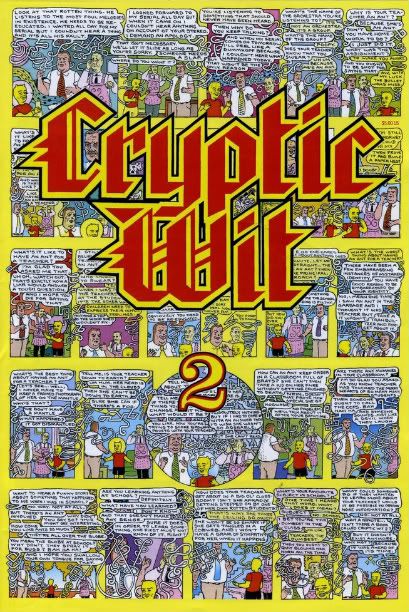
Cryptic Wit #2 (Gerald Jablonski; self-published, 32 pages, $5.00): This thing is goddamned excellent, but also very, very particular - Jim Woodring wasn't horsing around when he declared Jablonski's work possessed of "that alarming glass-hard veneer of isolated intellect that distinguishes the product of the bona fied lunatic." He meant that as praise; indeed, he wrote it in the foreword to Jablonski's first solo publication, the Fantagraphics-produced Empty Skull Comics from 1996. Then came the self-published Cryptic Wit #1 in 2002, and here we are in the present, lovely place.
Jablonski has made one major change to his comics approach for this issue: everything is now in blazing full color. Considering the sheer density of the man's work -- that cover above functions exactly like a typical page, minus the big title -- it's a very careful, nuanced job, even subtle at times, with nary a single Herrimanesque shifting background clashing with the characters in dialogue. There is some slight fuzziness to those teeny-tiny letters, maybe more a result of the printing than anything, but overall it's a standout effort.
And if you've never known any of this artist's efforts, be aware every comic is exactly one page long. There are only three types of comics: (1) Howdy, a corpulent fellow with fuzzy round ears, arguing with his nephew Dee Dee over the latter's choice in music, a conversation that inevitably turns toward the fact that Dee Dee's teacher at school is literally an ant; (2) grizzled Farmer Ned narrating exciting talking animal tales from the barnyard, of all places; and (3) a human boy and an alien/mutant boy fighting one another, sometimes in godly or psychedelically twisted forms. There are generally 24-30 panels per page. Types (1) and (2) are loaded with wordplay and witty exchanges, with some jokes repeating from story to story with slight variations. Type (3) often engages in loud formal play (the kids are only playing, you see). Endings seem dictated mainly by formulaic repitition and Jablonski running out of space at the bottom of the page.
It's wonderful, hypnotic work, good and bad jokes alike developing bizarre power through the sheer gale force of the artist's vision, page after page of effortlessly twisting speech bubble stems (mustn't forget those!) and disarmingly precise miniature renderings of fire-breathing dinosaurs and tipped milk jugs. A few smaller, newer motifs can be picked up by longtime readers - there's a lot of intergenerational conflict in this issue (differing values, experiences), and maybe a touch more self-reference, with Howdy & Dee Dee jokes leaking into the barnyard stuff, and Farmer Ned going on for upwards of five panels about how great (or possibly underwhelming) his story is going to be. Lots more Farmer Ned in general, actually, perhaps because his basic structure is more pliable...
Aw, but why am I going on? If any of this sounds even slightly interesting, follow the link above and get ready for an old-school, 'sending money in an envelope to a P.O. box' experience. Either your head or its ache will thank me later.
***
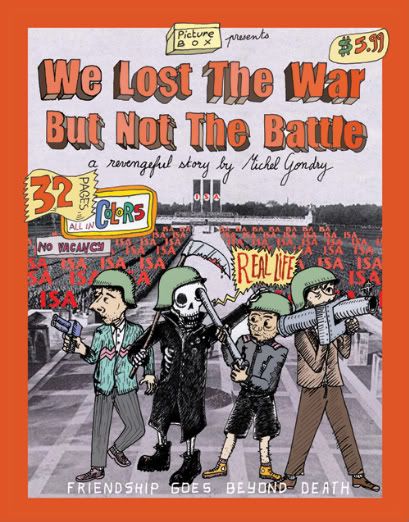
We Lost the War but Not the Battle (Michel Gondry; PictureBox, 32 pages, $5.99): Say, this is some kind of 'popular person from another art form does a comic' thing, right? He's even kind of a celebrity guy with the moving pictures and popular music commercials, eh? But, in keeping with Gondry's homey, let's-build-stuff! ethos, you can rest assured that every page -- from drawings to letter to colors -- were personally crafted to the fullest extent of handmade whimsy.
There's certainly a winsome appeal to Gondry's curly graphics, and anyone who draws their own back-of-issue merchandise ad gets a smile from me. The story, however, is also about what I've come to expect from the solo Gondry (more solo than usual, this being a comic), chock-full of knotty thematic threads and some determined immaturity, this time with an added splash of over-the-top misogyny, underplayed narratively so as to become disquieting nonetheless.
It's all about a fellow with no personality who subsumes his artistic impulses in the work world and stifles his son's creativity, but then he and three friends -- one of them dead, not that it stops him -- are forced to serve as the Greater Paris military since they lied their way out of compulsory service decades ago and the real army is busy trying to impress America by blowing shit up. Their mission: stop an invasion of hott Communist babes! Blood is spilled, sexual organs are unveiled, and Mia Farrow appears to fuck the main character, which I think is funny?
Not to ruin anything, but after winning the battle they lose the war because the sexy girls are cunning, and then they force all the men to choose between prison or (*gasp* *choke*) domesticity in exchange for sex which they just deny anyway after a while but then the main character and his son escape the city by popping out of a giant vagina, taking a living (male!) clitoris with them, and then they all live together doing arty and philosophic things with no gurls in sight while Paris becomes slaves of sexy rock. Friendship may go beyond death, but I guess it doesn't last long in the face of boring cohabitation aka no freedom! At least PiL-era John Lydon knows the score throughout.
A broad, fable-like message is discernible, with the lead character and his son moving from a world of guns, war, labor, conflict and apparently all sex, to be 'born' into a new world of... finer things? Gondry doesn't really distinguish much between zones of living, although he does just enough to posit the new world as better than the old one that he seems less thematically ambivalent than simply not inclined to give much of a shit for his narrative. I guess some readers might find it to have a dashed-off appeal, maybe like something scratched out while upset over some romantic issue, but I found the approach to be unsatisfyingly pinned between twee metaphor and ambling dirty jokes, its underlying frustrations registering as little more than petulance. Not enough horselaughs for $5.99 either.
***
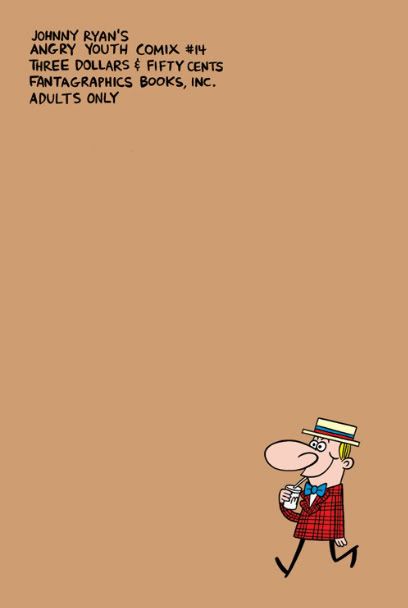
Angry Youth Comix #14 (Johnny Ryan; Fantagraphics, 24 pages, $3.50): Now this, on the other hand, is more than worth its price in pure mirth. But there's more! One thing that's often overlooked in comments about Ryan's work is the dedication he has to his style's evolution, in terms of both pure visuals and broad content.
As such, this newest issue sees the artist's signature series move further than ever into straight-up horror/exploitation territory, without losing a lot of ground in comedy. Boobs Pooter is back, this time unveiling The World's Funniest Joke: getting a guy to trip in a puddle of extra-slippery shit, which sets off a chain of events that utterly ruins his life, eventually leading to his stalking the streets as a bearded, cybernetic Rape Tank in search of kicks and revenge. But can anyone stop Boobs Pooter, the hilarious star of "Drabble the Movie" and other hits whose every action prompts crippling laughs in nearly everyone who isn't actually crippled in the process?
It's impressive seeing Ryan take a simple idea -- physical comedy isn't funny to people getting hurt -- and contorting itself across genres in such an intuitive way. Classic squirm images like a huge tube getting shoved into a man's penis are shortly followed by a nurse pulling a long cord of shit out of the man's ass, slinging it against the ceiling and zipping around crying "Look at me! I'm Spiderman Woman!" while knocking machines over.
All of it is paced neatly, with uniform 12-panel grids and rhythmic scene breaks, and room left for more ready-flowing conversational humor than I recall seeing from the artist. It's slick, something that I've found keeps Ryan's content from getting unbearable, and now it seems he's more eager than ever to push back without losing any force of attraction. Fascinating work.
***
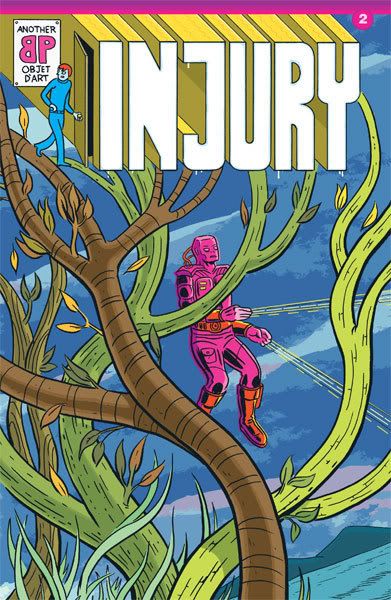
Injury Comics #2 (Ted May w' Jeff Wilson & Jason Robards; Buenaventura Press, 40 pages, $4.95): The kickoff story in this new issue of May's collaboration-focused series is pretty wonderful, tracking a few vivid hours in the life of teenage metalhead Jeff (the story's co-writer) circa 1983 as he moons over the girl he's dating ("She was wearing braces. Our kiss tasted like metal!") and visits a local carnival. Events of great temporary consequence occur, but nothing so urgent that the story can't stop for a few panels to watch a nerd get pantsed before breezing away. Tons of well-observed details, and nice graphic flourishes, like a long-haired guy's metal sense tingling when he hears Witchfinder General in an approaching car. May draws great shitty teenagers, the shittier the better.
It all sort of steamrolls the second story, part two of the series' ongoing serial about cyborg powerhouse Manleau and his battles, the kind of thing more prone to leaning on double entendres or wacky visual gags (like a Slade pinball machine) atop some decent fight pages (finished by Robards from May's layouts). It's entertaining enough, but kind of tinny; it could have used a dose of the weirdness suggested by that great-looking cover. But I'm mostly picking at stuff here - this is a good, half-great comic, and worth looking for.
***
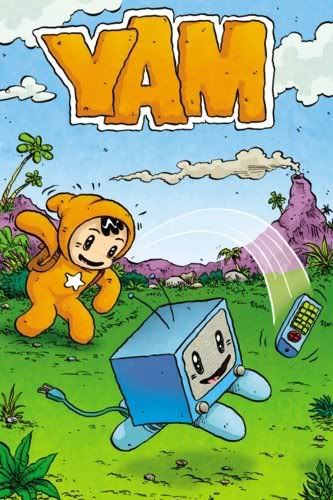
Yam: Bite-Size Chunks (Corey Barba; Top Shelf, 88 pages, $10.00): I am close to 100% the opposite of the ideal reader for Top Shelf's expanding line of wordless all-ages cutie-pie comics - I mean, god bless its many fans and rousing success, but I don't think I'm reading another Owly without a shotgun barrel kissing the nape of my neck.
Still, I'd call this the best of the bunch so far, in that Nickelodeon Magazine veteran Barba's got a considerable grasp of manga-informed iconography, set in some deftly rendered fantasy locales. There's a nicely varied sense of humor at work too, from the very sensible sight gag of the cover to a little story in which Yam (the kid in the jammies) sees a turtle with a cheeseburger for a shell, so he eats it, then a turtle with a pie for a shell, so he eats it, then one with a toilet for a shell, at which point Yam smiles bashfully at the reader. It's funny because Yam is about to take a big shit inside a living being!
Similar fun courses through these collected stories, and even when a new, longer story eases into the good values rhythm of children's television, with Yam learning to help people out and not blow off his friends and stuff, it's at least taken with the sort of fancy that'll allow the lil' hero to climb inside other people's dreams, dragging imagination into reality and digging into others' subconscious. I can enjoy that thought fine today, in all its hope and determination.
Hm? Why don't I drive in the right lane? Shit, I'm not doing 65 with those slowpokes.
REVIEW PILE LIBERATION CAMPAIGN #4
***

Cryptic Wit #2 (Gerald Jablonski; self-published, 32 pages, $5.00): This thing is goddamned excellent, but also very, very particular - Jim Woodring wasn't horsing around when he declared Jablonski's work possessed of "that alarming glass-hard veneer of isolated intellect that distinguishes the product of the bona fied lunatic." He meant that as praise; indeed, he wrote it in the foreword to Jablonski's first solo publication, the Fantagraphics-produced Empty Skull Comics from 1996. Then came the self-published Cryptic Wit #1 in 2002, and here we are in the present, lovely place.
Jablonski has made one major change to his comics approach for this issue: everything is now in blazing full color. Considering the sheer density of the man's work -- that cover above functions exactly like a typical page, minus the big title -- it's a very careful, nuanced job, even subtle at times, with nary a single Herrimanesque shifting background clashing with the characters in dialogue. There is some slight fuzziness to those teeny-tiny letters, maybe more a result of the printing than anything, but overall it's a standout effort.
And if you've never known any of this artist's efforts, be aware every comic is exactly one page long. There are only three types of comics: (1) Howdy, a corpulent fellow with fuzzy round ears, arguing with his nephew Dee Dee over the latter's choice in music, a conversation that inevitably turns toward the fact that Dee Dee's teacher at school is literally an ant; (2) grizzled Farmer Ned narrating exciting talking animal tales from the barnyard, of all places; and (3) a human boy and an alien/mutant boy fighting one another, sometimes in godly or psychedelically twisted forms. There are generally 24-30 panels per page. Types (1) and (2) are loaded with wordplay and witty exchanges, with some jokes repeating from story to story with slight variations. Type (3) often engages in loud formal play (the kids are only playing, you see). Endings seem dictated mainly by formulaic repitition and Jablonski running out of space at the bottom of the page.
It's wonderful, hypnotic work, good and bad jokes alike developing bizarre power through the sheer gale force of the artist's vision, page after page of effortlessly twisting speech bubble stems (mustn't forget those!) and disarmingly precise miniature renderings of fire-breathing dinosaurs and tipped milk jugs. A few smaller, newer motifs can be picked up by longtime readers - there's a lot of intergenerational conflict in this issue (differing values, experiences), and maybe a touch more self-reference, with Howdy & Dee Dee jokes leaking into the barnyard stuff, and Farmer Ned going on for upwards of five panels about how great (or possibly underwhelming) his story is going to be. Lots more Farmer Ned in general, actually, perhaps because his basic structure is more pliable...
Aw, but why am I going on? If any of this sounds even slightly interesting, follow the link above and get ready for an old-school, 'sending money in an envelope to a P.O. box' experience. Either your head or its ache will thank me later.
***

We Lost the War but Not the Battle (Michel Gondry; PictureBox, 32 pages, $5.99): Say, this is some kind of 'popular person from another art form does a comic' thing, right? He's even kind of a celebrity guy with the moving pictures and popular music commercials, eh? But, in keeping with Gondry's homey, let's-build-stuff! ethos, you can rest assured that every page -- from drawings to letter to colors -- were personally crafted to the fullest extent of handmade whimsy.
There's certainly a winsome appeal to Gondry's curly graphics, and anyone who draws their own back-of-issue merchandise ad gets a smile from me. The story, however, is also about what I've come to expect from the solo Gondry (more solo than usual, this being a comic), chock-full of knotty thematic threads and some determined immaturity, this time with an added splash of over-the-top misogyny, underplayed narratively so as to become disquieting nonetheless.
It's all about a fellow with no personality who subsumes his artistic impulses in the work world and stifles his son's creativity, but then he and three friends -- one of them dead, not that it stops him -- are forced to serve as the Greater Paris military since they lied their way out of compulsory service decades ago and the real army is busy trying to impress America by blowing shit up. Their mission: stop an invasion of hott Communist babes! Blood is spilled, sexual organs are unveiled, and Mia Farrow appears to fuck the main character, which I think is funny?
Not to ruin anything, but after winning the battle they lose the war because the sexy girls are cunning, and then they force all the men to choose between prison or (*gasp* *choke*) domesticity in exchange for sex which they just deny anyway after a while but then the main character and his son escape the city by popping out of a giant vagina, taking a living (male!) clitoris with them, and then they all live together doing arty and philosophic things with no gurls in sight while Paris becomes slaves of sexy rock. Friendship may go beyond death, but I guess it doesn't last long in the face of boring cohabitation aka no freedom! At least PiL-era John Lydon knows the score throughout.
A broad, fable-like message is discernible, with the lead character and his son moving from a world of guns, war, labor, conflict and apparently all sex, to be 'born' into a new world of... finer things? Gondry doesn't really distinguish much between zones of living, although he does just enough to posit the new world as better than the old one that he seems less thematically ambivalent than simply not inclined to give much of a shit for his narrative. I guess some readers might find it to have a dashed-off appeal, maybe like something scratched out while upset over some romantic issue, but I found the approach to be unsatisfyingly pinned between twee metaphor and ambling dirty jokes, its underlying frustrations registering as little more than petulance. Not enough horselaughs for $5.99 either.
***

Angry Youth Comix #14 (Johnny Ryan; Fantagraphics, 24 pages, $3.50): Now this, on the other hand, is more than worth its price in pure mirth. But there's more! One thing that's often overlooked in comments about Ryan's work is the dedication he has to his style's evolution, in terms of both pure visuals and broad content.
As such, this newest issue sees the artist's signature series move further than ever into straight-up horror/exploitation territory, without losing a lot of ground in comedy. Boobs Pooter is back, this time unveiling The World's Funniest Joke: getting a guy to trip in a puddle of extra-slippery shit, which sets off a chain of events that utterly ruins his life, eventually leading to his stalking the streets as a bearded, cybernetic Rape Tank in search of kicks and revenge. But can anyone stop Boobs Pooter, the hilarious star of "Drabble the Movie" and other hits whose every action prompts crippling laughs in nearly everyone who isn't actually crippled in the process?
It's impressive seeing Ryan take a simple idea -- physical comedy isn't funny to people getting hurt -- and contorting itself across genres in such an intuitive way. Classic squirm images like a huge tube getting shoved into a man's penis are shortly followed by a nurse pulling a long cord of shit out of the man's ass, slinging it against the ceiling and zipping around crying "Look at me! I'm Spiderman Woman!" while knocking machines over.
All of it is paced neatly, with uniform 12-panel grids and rhythmic scene breaks, and room left for more ready-flowing conversational humor than I recall seeing from the artist. It's slick, something that I've found keeps Ryan's content from getting unbearable, and now it seems he's more eager than ever to push back without losing any force of attraction. Fascinating work.
***

Injury Comics #2 (Ted May w' Jeff Wilson & Jason Robards; Buenaventura Press, 40 pages, $4.95): The kickoff story in this new issue of May's collaboration-focused series is pretty wonderful, tracking a few vivid hours in the life of teenage metalhead Jeff (the story's co-writer) circa 1983 as he moons over the girl he's dating ("She was wearing braces. Our kiss tasted like metal!") and visits a local carnival. Events of great temporary consequence occur, but nothing so urgent that the story can't stop for a few panels to watch a nerd get pantsed before breezing away. Tons of well-observed details, and nice graphic flourishes, like a long-haired guy's metal sense tingling when he hears Witchfinder General in an approaching car. May draws great shitty teenagers, the shittier the better.
It all sort of steamrolls the second story, part two of the series' ongoing serial about cyborg powerhouse Manleau and his battles, the kind of thing more prone to leaning on double entendres or wacky visual gags (like a Slade pinball machine) atop some decent fight pages (finished by Robards from May's layouts). It's entertaining enough, but kind of tinny; it could have used a dose of the weirdness suggested by that great-looking cover. But I'm mostly picking at stuff here - this is a good, half-great comic, and worth looking for.
***

Yam: Bite-Size Chunks (Corey Barba; Top Shelf, 88 pages, $10.00): I am close to 100% the opposite of the ideal reader for Top Shelf's expanding line of wordless all-ages cutie-pie comics - I mean, god bless its many fans and rousing success, but I don't think I'm reading another Owly without a shotgun barrel kissing the nape of my neck.
Still, I'd call this the best of the bunch so far, in that Nickelodeon Magazine veteran Barba's got a considerable grasp of manga-informed iconography, set in some deftly rendered fantasy locales. There's a nicely varied sense of humor at work too, from the very sensible sight gag of the cover to a little story in which Yam (the kid in the jammies) sees a turtle with a cheeseburger for a shell, so he eats it, then a turtle with a pie for a shell, so he eats it, then one with a toilet for a shell, at which point Yam smiles bashfully at the reader. It's funny because Yam is about to take a big shit inside a living being!
Similar fun courses through these collected stories, and even when a new, longer story eases into the good values rhythm of children's television, with Yam learning to help people out and not blow off his friends and stuff, it's at least taken with the sort of fancy that'll allow the lil' hero to climb inside other people's dreams, dragging imagination into reality and digging into others' subconscious. I can enjoy that thought fine today, in all its hope and determination.
Labels: RPLC

<< Home